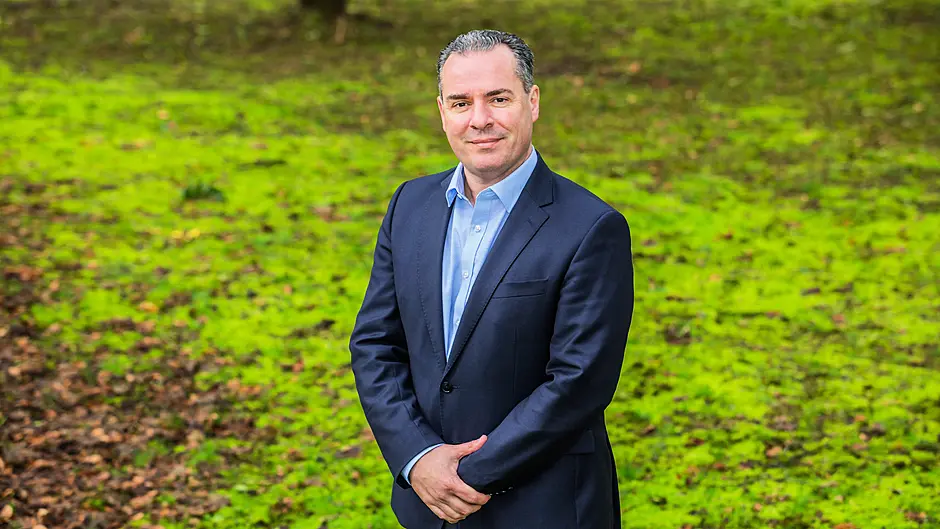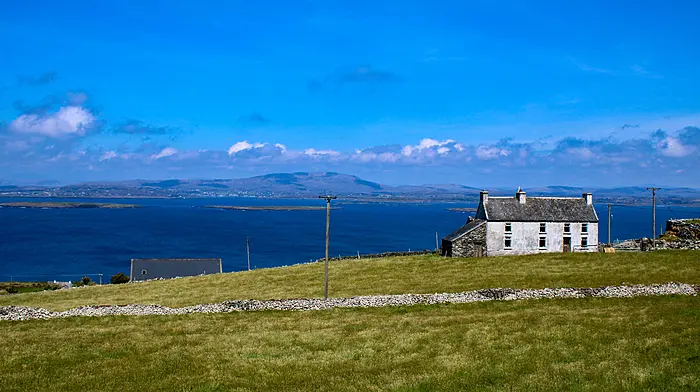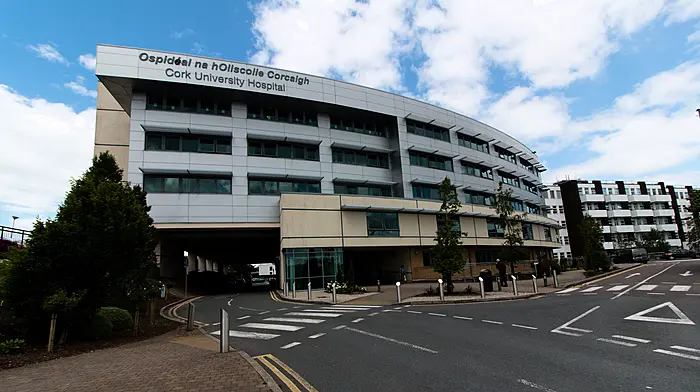Jason Hawkins, chief executive of Carbery, speaks to Emma Connolly about nitrates, sustainability, diversification and more
COMPENSATION has to be on the table for consideration for those farmers facing a herd cut when the nitrates derogation is reduced to 220kg nitrogen/ha from January.
That’s according to the ceo of Carbery Group Jason Hawkins who candidly admitted that not all of their suppliers will remain pro table if the European Commission decision which will impact stocking levels by an average of 10/12%, is implemented here.
For a farmer with 100 cows, that will be a cut to 88, and an income loss of 29% from next January. For context, two thirds of Carbery’s 1,200 suppliers are in derogation and its average supplier has 90 cows.
‘Compensation must be on the table in such a scenario,’ said Jason.
He pointed back to 2015, when milk quotas were removed: ‘At the time the national strategy was to support expansion in the dairy industry and frankly water quality, which is what the commission will base their decision on, wasn’t even a topic in Carbery then.’
Since then Carbery has been to the fore with the introduction of its Agricultural Sustainability Support and Advisory Programme (ASSAP) which has seen improvement in water quality in targeted areas.
It has also part of Farm Zero C, a project aiming to be the first climate neutral dairy farm.
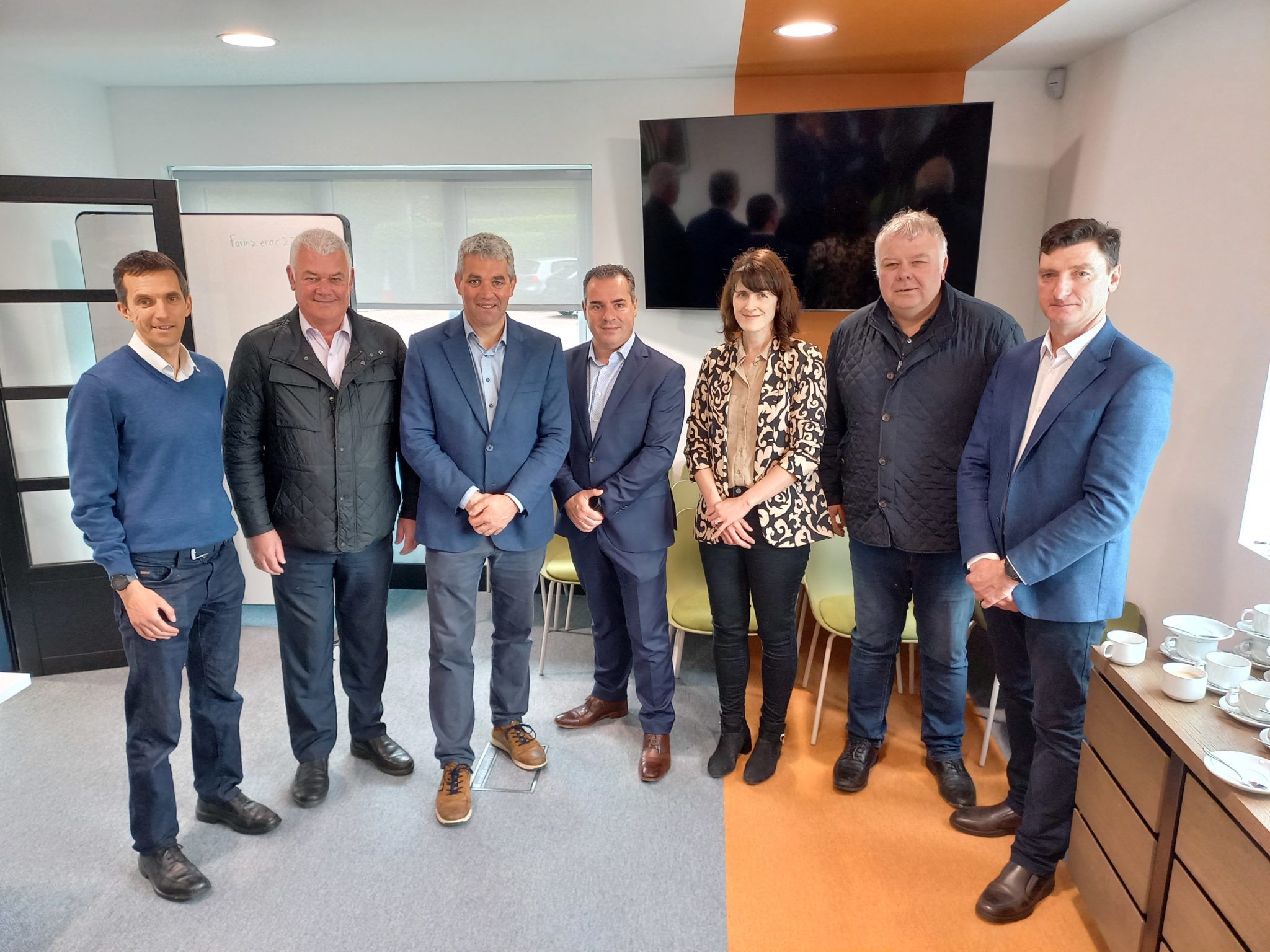 Farm Zero C is a collaboration between Carbery, BiOrbic and others to create a climate-neutral, economically-viable dairy farm. Members of the joint Oireachtas committee on agriculture visited the facility at Shinagh near Bandon earlier this year. From left: Kevin O'Connor BiOrbic UCD; Senator Paul Daly; Sen Tim Lombard. Jason Hawkins, chief executive, Carbery; Grainne Hurley, manager Teagasc West Cork, Sen Michael Fitzmaurice and Cormac O’Keeffe Carbery. (Photo: Denis Boyle)
Farm Zero C is a collaboration between Carbery, BiOrbic and others to create a climate-neutral, economically-viable dairy farm. Members of the joint Oireachtas committee on agriculture visited the facility at Shinagh near Bandon earlier this year. From left: Kevin O'Connor BiOrbic UCD; Senator Paul Daly; Sen Tim Lombard. Jason Hawkins, chief executive, Carbery; Grainne Hurley, manager Teagasc West Cork, Sen Michael Fitzmaurice and Cormac O’Keeffe Carbery. (Photo: Denis Boyle)
‘You can’t turn around and tell a dairy farmer who has made major investments in ’22 and ’23, that in ’24 you’re going to bring down cow numbers. That’s just not fair in any circumstances,’ he said.
‘We are disappointed that the European Commission are not reviewing Ireland’s derogation. While we acknowledge there is work to be done to maintain and improve water quality, a lot of work has been done by farmers already and we don’t think that removing derogation will achieve this. In our experience, more constructive and inclusive ways of working with farmers, like the ASSAP programme which we have supported since 2018, are a better way forward, and it is a shame that these efforts have not been allowed time to take effect by the Commission.
'We are also still waiting for information from the Commission and the Department of Agriculture to help us understand the full impact to Carbery and to our shareholders. The agriculture sector and farmers are resilient and adaptable and we have faced challenges before. However, farmers and the industry are in a very difficult position at the moment with the lack of information available around their own specific situation. Without this information, the 1st of January is an extremely challenging date to make these changes. In our strategy planning, we will be looking at all the scenarios to mitigate the impacts of losing derogation, and we will certainly continue to support our farmer shareholders with making the adjustments they will need to.
'However, farmers and the industry need time to plan and to make adjustments to their business,’ he said.
The Kerry man has been head of the Carbery group since 2018 and has successfully steered the company through major investment and diversification projects, including a €78m mozzarella plant, to futureproof against Brexit.
2023 has brought its own set of unique challenges to the dairy industry. Outside of the nitrates issue, milk prices have plunged from 55c/l last year to 39c/l in July, inputs continue to rise, there’s controversy surrounding lack of Tams grants for slurry storage investment, as well as labour shortages.
With Dairy Industry Ireland, he has been at the table with the Minister for Agriculture to discuss the nitrates issue, and Carbery has made submissions on the topic.
‘All the data is there from the work done over the past few years that progress is being made, including all the research being done at Farm Zero C and I’m optimistic that we’ll get there in meeting our climate emission targets. But the deadline imposed is frustrating for both the farmers and the industry as a whole.
'Getting more time would seem to me to be a sensible place to land on this,’ he said.
He said he couldn’t see any logic to suppliers’ ability to produce being reduced.
‘It comes down to a national agenda, a national decision. The carbon footprint of our grass based system is the lowest in the world and no one can argue with that. It makes no sense to me to cut back now at a time when we can see progress being made and when we have the data to prove that.
‘Part of my frustration is that the impact of what our suppliers are doing can get lost out there. The facts are that 80% of people globally consume dairy, that’s six billion people. But there’s a loud minority out there and if you listen to them, you’d think it was the opposite. Our focus is, and always will be, telling the story of what our suppliers do, and how well they do it.’
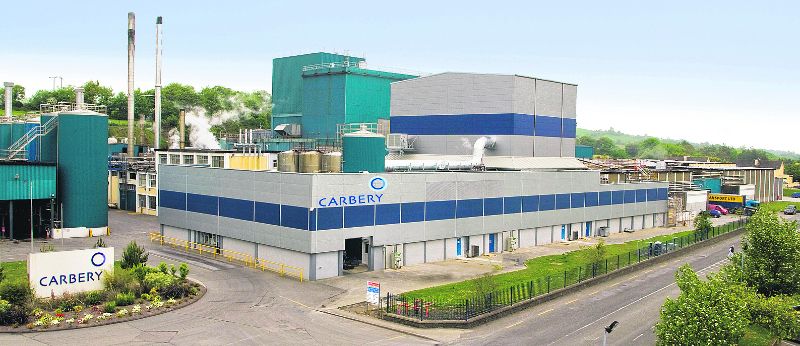 The Carbery Group's main headquarters at Ballineen.
The Carbery Group's main headquarters at Ballineen.
Last year Carbery Group, reported operating profits increased by 5% to €32.8m.
Its revenue went up by 31% to just under €701m.
It was the second full year of mozzarella production and there was stability in this business with a strong customer base across Europe and Asia. Its nutritional ingredients business had another strong performance. Their whey-based ingredients are used in nutritional applications such as Infant Formula, Sports Nutrition and Clinical Nutrition.
Customers are located across geographical markets including the Americas, Europe, Asia, Africa, Oceania and the Middle East.
Milk volumes processed in Ballineen, however, decreased slightly to 598m litres (-2% from 2021).
At the time of writing, it remained unclear if the new lower nitrates levels would be universally imposed, or if areas with improved water quality could continue to farm at the 250 level.
However, if stocking levels in West Cork are reduced from January, are supply issues anticipated in servicing markets the group has worked so hard to build?
‘We might see some short-term shortfalls in milk. It will be a challenge, but it won’t be existential for Carbery. It might mean a small step back, but we’d still be ahead from where we were in 2015,’ said Jason.
As for milk prices, he doesn’t have a crystal ball and it’s a case of reviewing from month to month.
Poorly performing dairy markets, and slow demand recovery has seen prices plummet from 55c/l last year to 39 c/l in July.
‘Farmers do end up absorbing a lot of the pain in this situation and that volatility isn’t good for anyone. It has to be about making a good income on a consistent basis,’ he said.
His frustration about industry challenges is palpable: ‘For me Carbery is all about our 1,200 suppliers, and the 2,000 farm families impacted by the business. We ask a lot of them and they always respond, and that’s why this situation is so frustrating. But we’re all in it together – it’s not a ‘them’ and ‘us’ situation.’
That said, he acknowledged that some farmers may not survive a drop in stocking levels.
‘There’s no viability issues with West Cork’s four co-ops, or Carbery. We will see this through, but there will be an existential threat to some individual farmers. But we have to remain optimistic – the alternative is to turn the lights off and give up, and that’s not what we’re about. Ultimately if the derogation is reduced here, we have responsibility to our farmers, to West Cork’s farm families, and to our workers and that’s where our focus and responsibility will remain.’
The current challenges are big, he admitted, but the long term milk price is positive, and long term the ability for the sector to be profitable is there.
‘Right now the biggest issue for our suppliers is the uncertainty out there. Farmers are agile and creative and have always figured a way through things, once they know the rules of the game.
'Not knowing the rules is a big part of the problem right now.’

